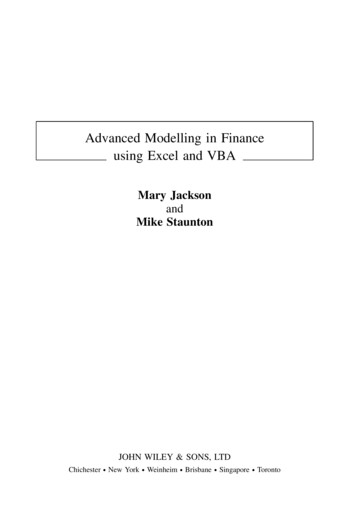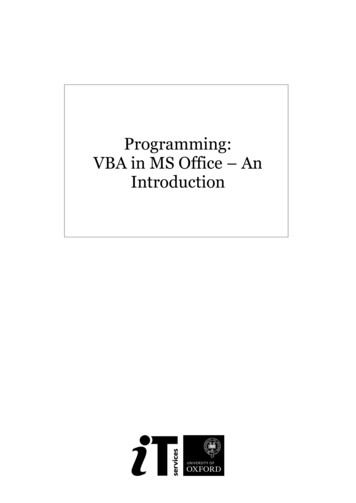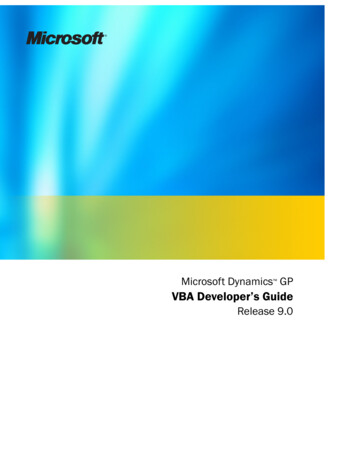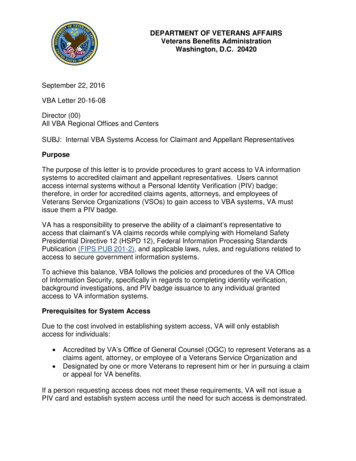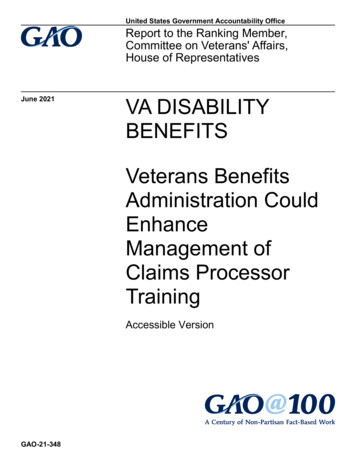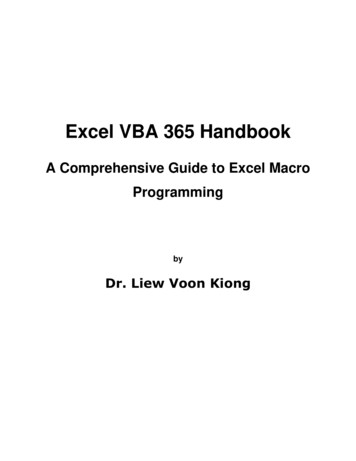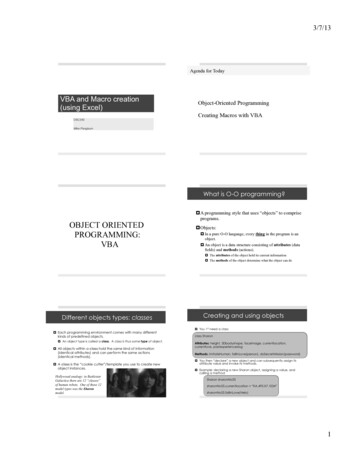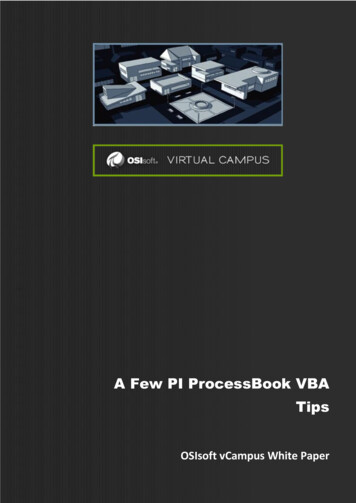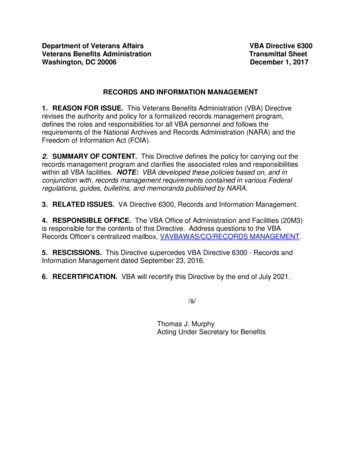
Transcription
Department of Veterans AffairsVeterans Benefits AdministrationWashington, DC 20006VBA Directive 6300Transmittal SheetDecember 1, 2017RECORDS AND INFORMATION MANAGEMENT1. REASON FOR ISSUE. This Veterans Benefits Administration (VBA) Directiverevises the authority and policy for a formalized records management program,defines the roles and responsibilities for all VBA personnel and follows therequirements of the National Archives and Records Administration (NARA) and theFreedom of Information Act (FOIA).2. SUMMARY OF CONTENT. This Directive defines the policy for carrying out therecords management program and clarifies the associated roles and responsibilitieswithin all VBA facilities. NOTE: VBA developed these policies based on, and inconjunction with, records management requirements contained in various Federalregulations, guides, bulletins, and memoranda published by NARA.3. RELATED ISSUES. VA Directive 6300, Records and Information Management.4. RESPONSIBLE OFFICE. The VBA Office of Administration and Facilities (20M3)is responsible for the contents of this Directive. Address questions to the VBARecords Officer’s centralized mailbox, VAVBAWAS/CO/RECORDS MANAGEMENT.5. RESCISSIONS. This Directive supercedes VBA Directive 6300 - Records andInformation Management dated September 23, 2016.6. RECERTIFICATION. VBA will recertify this Directive by the end of July 2021./s/Thomas J. MurphyActing Under Secretary for Benefits
December 1, 2017VBA Directive 6300RECORDS MANAGEMENT1. PURPOSE. This Veterans Benefits Administration (VBA) Directive defines policiesfor establishing and maintaining a formalized records management program within allVBA stations (e.g., regional offices, VBA Central Office, centers, off-site storagelocations, out-based sites, and alternative worksites). It establishes the roles andresponsibilities for VBA personnel to create, manage, use, store, and dispose of VBAFederal records in accordance with Department of Veterans Affairs (VA) and NationalArchives and Records Administration (NARA) policies.Authority: Title 36, Code of Federal Regulations (CFR), Chapter XII, Subchapter B.2. BACKGROUNDa. The Federal Records Act of 1950, as amended, contains the statutory authorityfor VBA records management. Government-wide responsibility for Federalrecordkeeping is shared by the General Services Administration (GSA) and NARA.b. Title 44 of the United States Code (U.S.C.) §§ 3301 through 3314 establishes thelegal basis for the disposal of records of the United States Government.c. The Paperwork Reduction Act, 44 U.S.C. Ch. 35, establishes the legal basis forminimizing the cost of information creation, collection, maintenance, use, dissemination,and disposition.d. VA Directive 6300 requires all administration leadership and other key officials todefine records programs within VA policy requirements, including assigning recordsmanagers and establishing of policies to manage records within the administration.e. On November 28, 2011, President Obama signed the Presidential Memorandum-- Managing Government Records. This memorandum marked the beginning of anExecutive branch-wide effort to reform records management policies and practices anddevelop a 21st-century framework for managing government records. VBA is working toimplement the 2019 mandate that requires federal agencies to manage all permanentelectronic records in an electronic format. Additionally, VBA is currently working withthe Department to implement the 2016 mandate requiring all federal agencies tomanage both permanent and temporary e-mail records in an accessible electronicformat.3. POLICYa. It is VBA policy that all Federal records contained on paper, electronic, or othermedia are properly managed from creation through final disposition, in accordance withfederal laws, the General Records Schedule (GRS) and VBA Records Control Schedule(VBA RCS) (VB-1)(VB-2).b. VBA will create and preserve records, in any medium, which document the2
December 1, 2017VBA Directive 6300functions, policies, decisions, procedures, and essential transactions of the agency.c. VBA will maintain and preserve records necessary to protect the legal andfinancial rights of the Government and of persons directly affected by its activities.d. VBA will make reasonable efforts to maintain records in formats or media that arereproducible for purposes of the Freedom of Information Act (FOIA).e. VBA is committed to enforcing the proper disposition of Veterans’ records byensuring the records are appropriately protected and maintained. The RecordsManagement Officer (RMO), Records Management Technician (RMT), and supervisorswill work together to ensure all VBA employees and affected parties follow establishedprocedures for storing, routing, and disposing of Veterans’ paper and electronic records.f. VBA will maintain records or information obtained from other Governmentagencies in accordance with VBA records management/ information security policies.VBA will comply with the rules, regulations, and restrictions of other agencies regardingthe use of their records.g. VBA will maintain and safeguard original military personnel/health records insuch a manner that VBA can return them when requested. VBA will not destroy anyoriginal military personnel/health records, or remove them from its custody for anyreason, without obtaining permission from the military service to which the recordsbelong.h. Effective immediately, all VBA employees, contractors, Veterans ServiceOrganizations, interns, volunteers, and any other affected parties, located at a VBAstation or a non-VBA station authorized by VBA, must comply with the revisedrequirements established in this document. They are required annually to take the VATalent Management System (TMS) Course #10176, “Privacy and Information SecurityAwareness and Rules of Behavior.” They must also electronically sign a Rules ofBehavior document at the end of the course. Any individual who violates this policy willbe subject to appropriate administrative action.i. Note: Where the general procedures set forth in this document address a matterthat is also addressed in the business-line specific appendices A through E, thebusiness-line specific process set forth in the relevant appendix will control.4. RESPONSIBILITIESa. The Under Secretary for Benefits. The Under Secretary for Benefits, ordesignee, is responsible for ensuring:1) VBA maintains an effective records management program.2) VBA maintains a vital records program to guarantee the continuity of essentialFederal Government activities during and following a national emergency, a3
December 1, 2017VBA Directive 6300technological or natural disaster, and to protect the rights and interests of VAbeneficiaries and employees.3) VBA appraises all records and publishes their approved retention periods inthe appropriate RCS VB-1, PART I & PART II.4) VBA places the Records Program Office at a level in VBA with sufficientauthority and funding to efficiently and effectively implement the objectives and policiesof the VBA records management program.5) VBA’s records management program provides access to records, regardlessof the medium, when requested.b. Directors. Directors are responsible for complying with this recordsmanagement policy by:1) Delegating local and appropriately trained RMTs to temporarily serve asalternate RMOs during the latter’s absence or unavailability (e.g., leave, training).2) Ensuring employees complete all required records management training.3) Ensuring stations or other designated areas under their control meet allrequirements for the creation, maintenance, use, storage, and disposition of Federalrecords generated or obtained within their operations (see the lifecycle of records underGRS or the appropriate RCS VB-1, PART I & PART II.4) Ensuring their station conducts an annual review of records controlprocedures and activities as part of their Systematic Analyses of Operations (SAOs).5) Ensuring each employee has a red envelope and red corrugated box, withsufficient quantities on hand to replace unserviceable ones.6) Ensuring staff follow the policies and procedures outlined in this Directive,GRS, RCS VB-1, PART I & PART II, and the Title 36 CFR, Chapter XII, Subchapter B inorder to create and preserve documents pertaining to the functions, policies, decisions,procedures, and essential transactions of the station.7) Directors must certify to the Under Secretary for Benefits annually that allemployees are aware of the policies for the maintenance, review, and appropriatedisposition of Veterans’ and other governmental papers located in all VBA facilities andworksites per this Directive.Note: Due to the level of responsibility, SES and RO Director personnel may becreating Permanent VBA records. Care should be taken that these individuals’ workproducts and e-mails are maintained per RCS VB-1 or the appropriate GRS.4
December 1, 2017VBA Directive 6300c. VBA Records Officer. The VBA Records Officer, or designee, is responsible forestablishing processes and guidance in compliance with this policy, to include:1) Developing and maintaining VBA-specific policies and procedures for thedevelopment, maintenance, storage, and disposition of Federal records created withinVBA.2) Developing and maintaining RCS VB-1, PART I & PART II, in accordancewith NARA requirements.3) Managing applications and petitions to modify existing records schedules andsubmit future RCS requests.4) Developing and maintaining a formal records management program specificto records created, used, stored, and dispositioned within VBA Central Office.5) Distributing policies, procedures, and notifications from the VA RecordsOfficer or NARA to all VBA RMO/RMTs and other appropriate personnel.6) Providing guidance to all VBA staff on the applicability of VA policy and NARArequirements.7) Reporting all violations to NARA.8) Ensuring all VBA RMO/RMTs complete all training requirements.d. RMO/RMTs. RMO/RMTs are responsible for:1) Reviewing records to ensure requests for disposition and disposal ofdocuments comply with the procedures outlined in this policy.2) Providing all new employees with a packet containing VBA’s disposition anddisposal policy, with other records management materials, and ensuring employeesknow and understand where to locate information pertaining to VBA’s recordsmanagement policy and procedures.3) Conducting appropriate training with each individual(s) (i.e. employee and/orsupervisor) who violates records policy.4) Maintaining a records violation log by utilizing VBA Forms 23-0980 (RecordsManagement Officer (RMO) Violation Report) and 23-0980-1 (Records ManagementOfficer (RMO) Violation Report Log) to identify and document violations to this policy.Violations will be reported to the VBA RMO via the organizational mailbox VAVBAWAS/CO/RECORDS MANAGEMENT. These reports will be provided not laterthan the fifth day of the month following the identified violation.5
December 1, 2017VBA Directive 63005) Tracking violations to identify repeat offenses by the same individual(s).Reporting repeat offenders to the station Director and VBA Records Officer soappropriate administrative action may be taken.6) Annually completing TMS #3873736, “Records Management for RecordsOfficers and Liaisons.” Attending NARA’s KA1- Records Management Overviewcourse.7) Completing and maintaining proper inventory/file plans for the station.8) Performing additional duties and responsibilities contained in the RMO/RMTPosition Description.Note: Division Records Management Officers (DRMOs) are responsible for the sameduties, roles, and responsibilities listed in this Directive for the RMO/RMT positions.e. Supervisors. Supervisors are responsible for:1) Ensuring staff follow the policies and procedures outlined in this Directive,GRS, RCS VB-1, PART I & PART II, and the Title 36 CFR, Chapter XII, Subchapter B inorder to create and preserve documents pertaining to the functions, policies, decisions,procedures, and essential transactions of the station.2) Reviewing all records, both hardcopy and electronic, submitted byemployee(s) for disposition or disposal to ensure they comply with the proceduresoutlined in this policy.3) Reporting all violations to the RMO/RMT and taking the appropriateadministrative action.f. Employees. Employees are responsible for:1) Maintaining their workspace and ensuring all records are submitted fordisposition and disposal in accordance with the procedures outlined in this policy.2) Protecting Personally Identifiable Information (PII) and other VA sensitiveinformation.3) Completing the VA Talent Management System (TMS) Course #10176,“Privacy and Information Security Awareness and Rules of Behavior.”5. HARDCOPY RECORDS DISPOSITION PROCEDURESa. Shredding Boxes and Envelopes1) Each employee will receive two red envelopes and a red corrugated box in6
December 1, 2017VBA Directive 6300which to place records for disposal.2) Each Station will purchase and distribute to all employees the appropriatequantity of red envelopes and boxes.3) All red envelopes and boxes will be labeled with the applicable employee’sname.4) Employees must reuse the red envelopes and boxes and will not destroythem.b. Disposal of Records.1) Only non-records, temporary records, identifiable duplicate records, andrecords created and generated electronically that can be replicated (e.g., recordscoming from the VBMS eFolder, a Virtual VA file, or other electronic systems of record)will be placed in the red corrugated boxes.2) Place all records described above containing PII into the red envelopes.3) The following records containing PII require only the employee’s signatureand date before placing in red envelopes: Records identified in GRS or RCS VB-1, PART I & PART II as being nonrecords, temporary records, or records approved for disposalDraft records (e.g., memos, letters, rating decisions) with a legiblewatermark stating “Draft”Training materials4) The following records containing PII require two signatures (employee(s)and supervisor) and date before placing them in a red envelope: Duplicate benefits-related and evidentiary submissions submitted from theVeteran’s representativeWaivers, administrative decisions, formal findings, etc., that the Veteran orthe Veteran’s representative submit and are duplicate VA documents ofevidentiary natureDuplicate evidentiary submissions from third partiesAll copies of benefits-related materials printed from a system of record(e.g., eFolder, Virtual VA file) (two signatures will be required to verify theyare printed copies until all benefits- related material are printed off withsome type of watermark that identifies them as printed copies)5) Safeguard documents containing Federal tax information by following IRSPublication 10757
December 1, 2017VBA Directive 6300Note: Due to the United States Court of Appeals decision, Robinson v. McDonald, noCompensation benefit-related records may be destroyed. All Compensation benefitrelated records must be maintained in hardcopy form.c. Disposition of Records1) All permanent records and VA sensitive information are to follow an approvedrecord disposition plan, see GRS and RCS VB-1, PART I & PART II, to include; (1)retaining; (2) transferring to a records center for temporary storage; (3) transferring toan archival agency; (4) donating to an eligible repository; and (5) transferring to anapproved image reproduction vendor.Note: Never place permanent records, sensitive information, and temporary recordscontaining PII with trash, recycling, or other refuse.Note: Each business line should follow its program-specific handling instructions asshown in the respective appendix. For any other documents that are processed outsideof the program-specific handling instructions (e.g., printed documents from SOR), theywill be dispositioned per this Directive and the respective RCS VB-1, PART I & PART IIaccordingly.d. Roles for Hard Copy Record Disposal1) Employee Role Bundle records (staple multiple pages) by beneficiary or claimant’s name Sign, date, and annotate the top page with the reason for disposal (e.g.,duplicate record) Place bundles too thick to be stapled in regular envelope(s) or fasten byrubber band(s) Deliver all records to supervisor for a second signature during the timesscheduled by the supervisor Place all records into red envelopes or boxes after they are returned bythe supervisor2) Supervisor Role Review records submitted by the employees to determine if disposal isappropriate If approved, sign and date the record(s) and turn in to the RMO/RMT If supervisor finds records improperly marked for disposal, notify theemployee of the violation found during review and report the violation tothe RMO/RMT If the RMO/RMT returns records they determined as inappropriatelysubmitted for disposal and the supervisor disagrees with the finding, theyshould create a justification/explanation letter and return to RMO/RMT.Otherwise, return records to employee(s) for proper disposition8
December 1, 2017VBA Directive 63003) RMO/RMT Retrieve red envelopes and boxes per designated schedule approved bythe Director or Assistant/ Deputy Director Review records to ensure they comply with this policy Update the violation tracking log Notify supervisor and return all records inappropriately submitted fordisposal to supervisor Conduct appropriate training when a violation has occurred Notify the VBA Records Officer of any violations on a monthly basis Keep a log of all records approved for disposal6. ELECTRONIC RECORDS DISPOSITION PROCEDURESa. Disposal of Records1) Delete only temporary records, non-records, or records approved for disposalaccording to the GRS and RCS VB-1, PART I & PART II.2) Once a record is uploaded or created in an electronic system, it cannot bedeleted without requesting assistance from a program-designated Service Desk orauthorized Administrator. No employee should be able to delete a record directly. TheRMO/RMT must be notified so the record can be recorded on the disposal log.3) If a record is identified as being misfiled in an electronic system, theemployee shall take immediate action to relocate the document to the correct recordlocation and follow approved procedures to have the misfiled record deleted from theincorrect location.4) Safeguard documents containing Federal tax information by following IRSPublication 1075Note: Each program office will be responsible for developing its own procedure policyon managing deletion of records within their electronic systems of record (e.g., M21-1,Part III, Subpart ii, Chapter 4, Section G- Folder Maintenance).b. Disposition of Records1) All electronic permanent records and VA sensitive information records aretreated the same as hardcopy records and should follow an approved record dispositionplan, see RCS VB-1, PART I & PART II, to include (1) retaining, (2) transferring to arecords center for temporary storage, (3) transferring to an archival agency, (4) donatingto an eligible repository, and (5) transferring to an approved image reproduction vendor.Note: Never delete permanent records or VA sensitive information.7. HANDLING OF UNIDENTIFIABLE MAIL9
December 1, 2017VBA Directive 6300a. Disposal of Hardcopy Unidentifiable Mail Records1) All unidentifiable mail should be turned in to the RMO/RMT.2) Unidentifiable mail will be maintained in a folder marked as “UnidentifiableMail” in alphabetical order by calendar year.3) At the end of the calendar year, mark the folder as closed with the date.4) After eighteen months follow proper disposition procedures.b. Disposal of Electronic Unidentifiable Mail Records1) Each program office will be responsible for developing its own procedurepolicy on managing deletion of unidentifiable mail records within their electronic systemsof record (e.g., M21-1, Part III, Subpart ii, Chapter 1, Section B- Mail Management).8. HANDLING OF CONGRESSIONAL CORRESPONDENCEa. The Office of Administration and Facilities is working on updating the VBA RCSpertaining to disposition procedures for Congressional correspondence. Until theupdate is approved, all VBA stations will follow this policy.1) All VBA stations will follow the VBA RCS VB-1Part II Item Number 2-3.2 fordisposition of Congressional correspondence.2) Congressional correspondence pertaining to benefit- related issues should betreated as evidentiary and be placed in the Veterans hardcopy folder as well asuploaded into the eFolder.9. HANDLING OF CLASSIFIED MATERIALa. VBA does not accept classified materials for claims processing. VBA onlyaccepts, handles, and processes “Sensitive” or “Unclassified” Veterans’ compensationclaims related document materials. VBA is not equipped nor permitted to receive,handle, copy, store, maintain, or process classified documents. This is due to nothaving the appropriate level Sensitive Compartmented Information Facility (SCIF) or theappropriate level classification safes associated with maintenance and storage ofclassified documents that these classified security levels require.10. ACCOUNTING OF CERTAIN DISCLOSURESa. Each station will keep an accurate accounting of requests (e.g., FOIA or Privacyrequests) for any record under its control from which information is retrieved. FOIArequests should be tracked and maintained in the FOIAXpress system. For moredetailed instructions on Privacy, please reference 5 U.S.C. 552a(c). Stations will followthis procedure manually until an electronic accounting system is developed for VBAuse.10
December 1, 2017VBA Directive 6300b. Proper accounting will include the following information.1) The date2) Identifier (e.g., name, identifying number, or symbol) of record about whichinformation is being requested3) Name and address of the person or agency making the request4) Nature of the requestc. After disclosure, the stations designated Privacy person will maintain theaccounting on file for a minimum of five years or the life of the record, whichever islonger.d. The accounting will be made available to the individual named in the record athis/her request.e. The station’s designated Privacy person will inform any person or other agencyabout any corrections or notation of dispute of any record that has been disclosed.11. MAINTAINING AND HANDLING OF NON-WORK RELATED RECORDSa. Employees are permitted, at their own risk, to maintain their own PII at theirassigned workstations. However, employees are strongly encouraged to secure thisinformation at home.b. The depositing of employee personal non-work related items within the red shredboxes for disposal is not authorized. This is considered to be a violation of policy dueto being a contracted government service.12. ITEMS ACCEPTABLE FOR DISPOSAL IN EMPLOYEE TRASH CANSa. The following items may be placed in employee trash cans as long as the itemsdo not contain any PII or protected information.1) Food-related waste (food wrappers, containers, paper plates/cups)2) Packaging materials, including corrugated cardboard, bubble or plastic wrap3) Other plastic items, including file tabs, colored document flags, envelopes,and clear plastic packing tape4) Pasteboard food, medication boxes, and cardboard backs of paper tablets5) Napkins/facial tissue6) Personal magazines and newspapers7) Adhesive or “post-it” notes8) Phone message slips13. HANDLING DISPOSITION OF EMPLOYEE SENSITIVE MATERIAL11
December 1, 2017VBA Directive 6300a. Employee sensitive records (e.g., employee records, corrective actions, andawards) are usually maintained by supervisors, managers, or human resources officials.These records should be delivered directly to the RMO/RMT in a sealed envelope(s)with the source and type of record clearly identified and signed on the outside of theenvelope by the appropriate senior official.14. SPECIAL INSTRUCTIONS FOR DNA SPECIMENSa. The Department of Defense retained DNA specimens in Servicemembers’ healthtreatment records from 1992 until 1996. In June 1996, the Assistant Secretary ofDefense directed the removal of the specimen samples from the health records. ReferDNA specimens found in VA claims folders to the nearest VA Medical Center fordisposition. ROs are encouraged to enter into a memorandum of agreement (MOA)with their respective VA medical campus for disposition of DNA specimens. Dispositionof medical x-rays will follow the proper disposition outlined in VBA RCS, VB-1, Part I,Field, Section XIII, Item 13-061.100 RCS VB-1, PART I & PART II dated January 31,2014.15. OUT-BASED LOCATIONS AND TELEWORK EMPLOYEESa. Out-based locations with assigned full-time supervisors and/or officers-in-chargeare authorized to have shredders that comply with VA standards. Supervisors exercisedirect control of these shredders. Locations co-located with a VA Medical Center oroutpatient clinic with shredding service contracts in place are authorized to use thefacility’s shredding service once a memorandum of understanding (MOU) or similardocument is in place to establish and clarify the records disposal procedures. Theseout-based locations are required to follow the same records disposition and disposalprocedures as outlined in this directive. However, out-based supervisors must review100 percent of the records submitted for disposal. All out-based locations are subject tounannounced annual compliance reviews.b. Out-based locations staffed only by non-supervisory employees and teleworkemployees are not authorized to dispose of any records. They must physically bringthese records to the nearest VBA station or send them to the station via UPS or otherapproved carrier on a regular schedule for review and approval as outlined in this policy.c. Out-based facilities staffed only by non-supervisory employees and teleworkemployees located nearer to a station other than their assigned station may send theirrecords to the station that is nearest and/or most cost-efficient. In these cases, thestation having jurisdiction of the employees and the station that will handle recorddisposition and disposal must create a memorandum of understanding (MOU) or similardocument that will establish and clarify the records disposal procedures in accordancewith this directive.16. HANDLING SHREDDING REQUESTS FROM TENANTS HOUSED IN VBAFACILITIES12
December 1, 2017VBA Directive 6300a. Veterans Service Organizations and other VA organizations (e.g., Office ofInformation and Technology, General Counsel) housed in VBA facilities who use stationdisposal services should clearly identify the source(s) and type(s) of records on theoutside of the record before delivering them directly to the RMO/RMT. The seniorleader, or designee, for each of the organizations must sign the record with the name ofthe official clearly identified. The RMO/RMT will dispose of the material without furtherreview. Preferably, the RMO/RMT will keep this material separate from the normaldisposal record(s) he/she reviews.17. MAINTAINING GOVERNMENT RECORDS IN EMPLOYEE WORKSTATIONSa. All official claims folders, Federal tax information, and claims-related recordsmust be stored in open areas on employee desks, in clearly marked claims file banks,or unlocked desk or file drawers specifically used to store assigned cases.b. Operations reports, lists, and related workload management records may bestored on employee’s desks or in labeled drawers. Training records containing unredacted PII must be kept in an area clearly marked as “training records” and may notbe removed from employees’ workstations. Supervisors and RMOs/RMTs areresponsible for ensuring compliance with all aspects of this policy, to include inspectionof employee workstations.c. The policy on storing records in open and unlocked areas does not apply tofunctions performed by the Agent Cashier. Storage procedures for convenience checksand other negotiable documents remain unchanged.18. WORKSTATION COMPLIANCE INSPECTIONSa. The purpose of workstation inspections is to monitor compliance with theprovisions of this policy and undertake the appropriate education, training, additionalmonitoring, or other necessary actions.b. Quarterly, RMOs/RMTs will conduct unannounced inspections of workstations of25 percent of station employees who process benefits-related claims to ensurecompliance with this directive.c. RMO/RMTs will randomly conduct spot-checks of employee trash cans.d. The Support Services Chief or designee will oversee the inspections to ensureaccountability.e. Non-compliance issues requiring more frequent inspections are at the discretionof the Director.f. Out-based employees who transport and/or store claims-related paper records at13
December 1, 2017VBA Directive 6300their out-based facility will be subject to annual inspections by a supervisor, RMO/RMT,Privacy Officer, or other Director designee.g. Telework employees who transport and/or store claims-related paper records attheir alternate worksite will be subject to annual inspections by a supervisor, RMO/RMT,Privacy Officer, or other Director designee. However, telework employees who do nottransport and store claims-related paper records at their alternate worksite will not besubject to these annual inspections.h. All Directors and Supervisory Employees (i.e., Coaches, AVSCMs, VSCMs, andAssistant Directors) are exempt from workstation compliance inspections.19. SHREDDING SERVICE CONTRACTSa. The use of shredding service contracts is the preferred disposal method, unlessa contract is not available in the area or it is not cost effective. On-site shredding by ashredding service, and witnessed and certified by the RMO/RMT, is the preferredmethod of verifying the shred process. The shredding service provider/contractor andthe RMO/RMT must certify each shredding event.b. Taking material off-site for shredding may be the only option in some locations.When using off-site shredding, the contractor must certify in writing the process meetsVBA standards for disposal as outlined in this dire
conjunction with, records management requirements contained in various Federal regulations, guides, bulletins, and memoranda published by NARA. 3. RELATED ISSUES. VA Directive 6300, Records and Information Management. 4. RESPONSIBLE OFFICE. The VBA Office of Administration and Facilities (20M3) is responsible for the contents of this Directive.
![[MS-VBAL]: VBA Language Specification - Framework](/img/22/ms-vbal.jpg)

